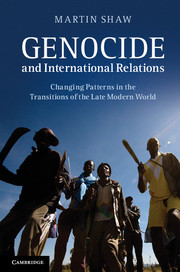Book contents
- Frontmatter
- Dedication
- Contents
- Acknowledgements
- Introduction
- Part I Perspectives
- Part II Twentieth-century genocide
- 4 European genocide: inter-imperial crisis and world war
- 5 The 1948 Convention and the transition in genocide
- 6 Cold War, decolonization and post-colonial genocide
- 7 The end of the Cold War and genocide
- Part III New patterns of genocide
- Bibliography
- Index
4 - European genocide: inter-imperial crisis and world war
Published online by Cambridge University Press: 05 June 2014
- Frontmatter
- Dedication
- Contents
- Acknowledgements
- Introduction
- Part I Perspectives
- Part II Twentieth-century genocide
- 4 European genocide: inter-imperial crisis and world war
- 5 The 1948 Convention and the transition in genocide
- 6 Cold War, decolonization and post-colonial genocide
- 7 The end of the Cold War and genocide
- Part III New patterns of genocide
- Bibliography
- Index
Summary
This chapter revisits the classical modern sites of genocide in twentieth-century Europe and explores the scope for international-historical explanations. An alternative to the comparative genocide paradigm should not only expand the range of genocide research beyond the mega-genocides: it also needs to reframe these episodes, above all the seminal Holocaust and Armenian cases. These archetypal ‘stand-alone’ genocides are assumed to be state-centric and based on a particular regime type, and are often seen in a domestic frame despite their roots in international wars. They need to be reinserted in a larger historical narrative of nationalist population-politics in the crisis of the European imperial system. However this requires a theoretical reorientation, with which I begin this chapter.
The ‘nation-state-empire’ and the ‘inter-imperial’ international system
The major problem in ‘international’ explanations of genocide to date has been an over-generalized understanding of the international ‘system’ as a Westphalian, sovereignty-centred structure. To understand how genocidal war in Europe in the first half of the twentieth century was implicated in internationally systematized relationships, we need to specify historically our concept of the ‘system’, focusing on the particular character of statehood and interstate relations in the period that culminated in the Second World War. We need to move away from the abstract concept of sovereignty and examine the content of power relationships within as well as between states. In particular, we need to integrate two core aspects of statehood – nationality and empire – into our understanding of interstate relations.
- Type
- Chapter
- Information
- Genocide and International RelationsChanging Patterns in the Transitions of the Late Modern World, pp. 67 - 85Publisher: Cambridge University PressPrint publication year: 2013



